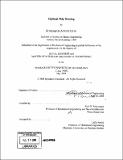Optimal ship routing
Author(s)
Avgouleas, Kyriakos
DownloadFull printable version (56.88Mb)
Other Contributors
Massachusetts Institute of Technology. Dept. of Mechanical Engineering.
Advisor
Paul D. Sclavounos.
Terms of use
Metadata
Show full item recordAbstract
Fuel savings in ship navigation has always been a popular subject in the maritime industry as well as the world's largest Navies. Oil prices and environmental considerations drive the effort for more fuel-efficient navigation. This thesis addresses the problem of deterministic minimum fuel routing by applying optimal control theory in conjunction with state of the art hydrodynamic and weather forecasting tools. A fictitious trans-Atlantic route is established and the optimal combination of speed and heading is determined, so that fuel consumption is minimized while certain safety constraints are met. The safety constraints are defined as the probabilities of slamming and deck wetness, both of which are not allowed to exceed prescribed limiting values. The problem formulation adopted in the thesis lies in the framework of Dynamic Programming, which is most suitable for computer implementation. The hydrodynamic performance of the ship is computed through the use of SWAN1, an advanced frequency domain CFD code. With the aid of SWAN1, ship motions and resistance can be accurately calculated. The latter includes the estimation of mean added resistance in waves, which has a major effect on the fuel consumption of ships sailing in rough seas. Wave and swell forecasts are provided in a deterministic setting by a third generation numerical wave model, the WAM cycle 4, developed at the European Center for Medium-Range Weather Forecasts (ECMWF). Utilizing the hydrodynamic results and the output of the wave model a computer program is developed in MATLAB®, which employs the Iterative Dynamic Programming algorithm to solve the optimal control problem.
Description
Thesis (Nav. E. and S.M.)--Massachusetts Institute of Technology, Dept. of Mechanical Engineering, 2008. Includes bibliographical references (p. 114-118).
Date issued
2008Department
Massachusetts Institute of Technology. Department of Mechanical EngineeringPublisher
Massachusetts Institute of Technology
Keywords
Mechanical Engineering.